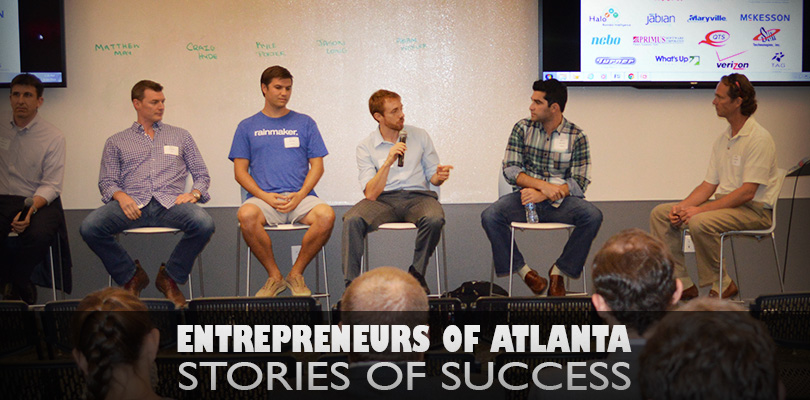
A couple weeks ago I was on a panel called “Entrepreneurs of Atlanta: Stories of Success” for the Technology Association of Georgia. We were asked some really great questions, and I think we have some solid, honest advice for other entrepreneurs out there. Since this information is so relevant to our BrainLeaf users, I thought I’d highlight some of the discussion from that event here.
1. What distinguishes an Entrepreneur from a Wantrepreneur? How do you determine if an idea is viable, has potential as a startup? Where do you start? What should you avoid?
Action. The number one thing that I see in people wanting to do something vs. actually doing it is… actually doing it.
Before you get started on a new business venture, ask yourself: is this a lifestyle business or a high potential business? You’ve got to know where you want to go with it before you do anything. Along these lines, you need to know your exit strategy. What is your plan? I only start a new business once I’ve got these questions locked down.
As for more tangible advice, I always start with a mixture of potential client feedback and running the numbers.
- Reach out to a good number of your potential customers and ask if they would buy what you’re selling at the price you’re selling. If they say no, ask what would make them buy whatever it is you’re selling.
- Then, put together a spreadsheet that covers your costs, revenue, profit, and growth expectations over the next five years.
- If you’re not familiar with it already, take a look at “The Lean Startup”
2. What are the top three mistakes entrepreneurs make in starting a business?
- Not doing the numbers or making sure the new business has potential.
- Having a revenue model that is too complex.
- Managing people. When new entrepreneurs get burned, it’s because they don’t know how to manage their people.
3. As an employee of a startup or one that’s considering working at a startup, what are some signs to jump on the bus and what are some signs to run from the fire?
The number one indicator of startup success is going to be the CEO’s or leadership team’s previous experience starting and running a business. The startup may not be perfect right out of the gate, but effective leadership can quickly spot the holes and pivot to a better product or service. If you think leaders are mismanaging the startup, it’s probably time to leave.
4. How do you develop leadership traits personally and in a team to help ensure success?
Great question. The growth of your people, including yourself, is probably the most important thing you can do for a business. My perspective is that I work for my team. I try to figure out what will make them the happiest in their lives. The first step is having the right people on your team to make your business successful. The second step is meeting with them regularly. We always discuss what they and their families need, how they view success and how they want to grow. For example, we have all of our coders in Code Academy. We like to give them opportunities to teach others. Giving your team new responsibilities like teaching can help them continue to grow in their careers.
5. What are some of the communication pitfalls to watch out for?
- Never talk when you’re angry.
- Under-communicating. – Make sure to clearly communicate what you want and how you want it. Also, be sure to write down as much as you can for your team. They can’t read your mind and complex tasks require complex, clear instructions. Also, don’t forget, you can’t expect if you don’t inspect!
- Creating separation. When you start getting busy and successful, it’s easy to focus on the tasks in front of you and start letting your team get away. Keep close to your team, make sure they know they can talk to you and how to approach you, and keep everyone together. They are your most valuable assets!
6. What are the most important things to consider in building a team for a startup? How does this differ from larger more established companies?
I’ve never worked at a larger company, so I can’t really speak to that point, but I can speak about building a team at a small company / startup. Here are the main guidelines:
- Hire slowly, fire quickly.
- Hire for enthusiasm, creativity, and the ability to learn more than for experience.
- Hire people who are creative and can think.
- Hire people who are smarter than you.
7. What do you see for the Atlanta startup community over the next 3-5 years?
Things are going in the right direction. I’d love to see more big players coming to this region, and I think places like ATV are helping move that along. Pretty regularly now I hear about new angel funds popping up, but I am not heavily involved in those so I don’t have a great grasp as to where it is all going.
8. What sectors are the hottest for the Atlanta Market in terms of demand and talent?
Marketing IT and Healthcare IT. Clearly, I’m in IT, so that is my strength. There may be some other great industries that are growing in the area that our outside of my periphery.
Thanks to TAG and ATV for inviting me to a great panel. I learned a lot, and it was fun to share my experiences with such an enthusiastic young crowd.
As entrepreneurs, new or old, what are some of your questions?





